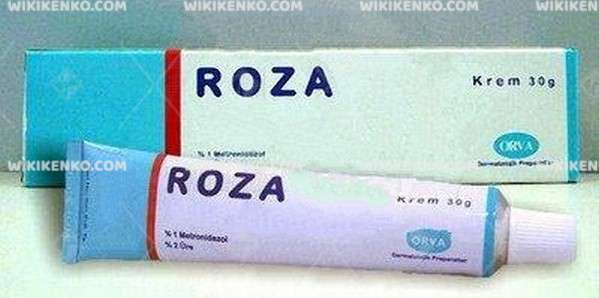Roza Cream
Delve into the world of Roza Cream, a topical medication renowned for its efficacy in addressing skin conditions. This comprehensive guide unveils its active ingredients, uses, application methods, potential side effects, precautions, and the manifold benefits it offers.
| Dosage form | |
|---|---|
| Pack size | |
| Potency | 30G |
| Manufacturer | |
| Origin | |
| Generic Name (Ingredient) | In 1 G Cream; Metronidazole 10 Mg (1%) Urea 20 Mg (2%) |
Assuming your emergency circumstances for this product, visit Urgent Quotation page. Besides, for any pharmaceutical questions, please ask us in the comments section.
Description
Roza Cream takes center stage as a formidable solution for a range of skin issues. In this exploration, we uncover the core components, application techniques, and the impact it makes in the realm of skincare.
Ingredients
This remarkable cream draws its strength from two primary active ingredients:
Metronidazole
Metronidazole, an antibiotic and antiprotozoal medication, forms the cornerstone of Roza Cream. With its ability to combat specific parasites and anaerobic bacteria (those thriving without oxygen), Metronidazole assumes a pivotal role in addressing skin lesions caused by rosacea.
Urea
Urea, a compound integral to numerous creams and lotions, contributes to the skin’s moisture content. By enhancing hydration, it bestows a softer and smoother texture to the skin.
The Purpose of Roza Cream
Roza Cream is predominantly employed for the management of rosacea, a skin condition characterized by redness, visible blood vessels, and the presence of small, red, pus-filled bumps.
A Guide to Application
For optimal results, follow these steps when applying Roza Cream:
- Preparation: Begin with clean, dry skin.
- Application: Apply the cream in a thin layer and ensure thorough rubbing.
- Cosmetics: If desired, cosmetics can be applied after Roza Cream.
Side Effects
As with any medication, Roza Cream may entail potential side effects. Common side effects of Metronidazole topical, a key component of Roza Cream, can encompass:
- Burning or Stinging
- Skin Redness or Irritation
- Dry, Scaly, or Itchy Skin
- Cold Symptoms: Including a stuffy nose, sneezing, and a sore throat.
In rare instances, serious side effects may manifest. If you experience symptoms such as numbness, tingling, or burning pain in your hands or feet, or stinging or burning upon applying metronidazole topical, seek immediate medical assistance.
Please note that this list is not exhaustive, and unlisted side effects may affect some individuals. If you notice any other effects, consult your healthcare professional. Always adhere to your healthcare provider’s guidance to ensure the information remains relevant to your unique circumstances.
Precautions
To safeguard your health, consider these precautions:
- Allergy Alert: Avoid Roza Cream if you are allergic to Metronidazole or any other cream ingredients.
- Avoiding Sensitive Areas: Prevent contact with the eyes and mucous membranes. If accidental contact occurs, thoroughly rinse with water.
Pregnancy and Breastfeeding
When it comes to using Roza Cream during pregnancy and breastfeeding, exercise caution:
- Pregnancy: While Metronidazole, a Roza Cream ingredient, is believed to pass into the bloodstream in minuscule amounts after skin application, its safety during pregnancy is not fully established. Use Roza Cream during pregnancy only if deemed essential by your doctor.
- Breastfeeding: Although specific information on Roza Cream’s use during breastfeeding is limited, it’s advisable to wash your hands after applying any topical treatment to prevent inadvertent ingestion.
For personalized guidance, consult your healthcare provider.
Recommended Dosage
The precise dosage of Roza Cream hinges on individual needs and the healthcare provider’s prescription. As a general guideline, Metronidazole gel or cream, such as Roza Cream, is typically applied twice daily after gently cleansing the affected area. If skin irritation or dryness occurs, reduce application frequency for a few days until skin recovery.
Treatment duration with Metronidazole can vary from six weeks to several months, and it’s imperative to follow your healthcare provider’s instructions regarding dosage and duration. For concerns or questions about your medication, consult your healthcare provider for the most reliable guidance.
| Patient Group | Dosage |
|---|---|
| General Use | Apply a thin layer twice daily after gently cleansing the affected area. |
| Skin Irritation | Reduce application frequency for a few days until skin recovers. |
| Duration of Treatment | Can vary from six weeks to several months. |
Multi-Faceted Benefits
Roza Cream, enriched with the active ingredients Metronidazole and Urea, delivers a wealth of advantages:
- Rosacea Management: The cream takes the lead in treating rosacea, a skin condition known for facial redness and visible blood vessels.
- Control of Excess Surface Oil: Roza Cream efficiently regulates surface oil, making it particularly valuable for individuals with oily or combination skin.
- Encouragement of Cellular Turnover: The cream’s exfoliating properties gently stimulate cellular turnover, reducing signs of premature aging.
- Restoration of Radiance: An advanced amino acid complex within the cream restores skin, promoting a more radiant appearance.
- Texture Smoothing: Mild exfoliation via Roza Cream helps even out skin texture and tone.
- Antioxidant Shield: The cream provides antioxidant protection, defending the skin against environmental stressors.
- Hydration Enhancement: Roza Cream replenishes hydration and supports a healthy skin barrier, ensuring optimal moisture levels.
Bear in mind that individual outcomes may vary, and it’s prudent to seek your healthcare provider’s counsel before initiating any new skincare regimen.
Conclusion
In the realm of skincare solutions, Roza Cream shines as a versatile asset. With its core ingredients and manifold benefits, it stands as a valuable ally in the fight against skin conditions. However, remember that all skincare treatments should be administered under the watchful eye of a healthcare professional. Their expertise ensures the safe and effective use of this cream, promoting your skin’s well-being and vitality.
Please note that this article offers informative content but does not substitute professional medical advice. Always consult a healthcare provider for personalized insights tailored to your specific situation.
Use the form below to report an error
Please answer the questions as thoroughly and accurately as possible. Your answers will help us better understand what kind of mistakes happen, why and where they happen, and in the end the purpose is to build a better archive to guide researchers and professionals around the world.
The information on this page is not intended to be a substitute for professional medical advice, diagnosis, or treatment. always seek the advice for your physician or another qualified health provider with any questions you may have regarding a medical condition. Always remember to
- Ask your own doctor for medical advice.
- Names, brands, and dosage may differ between countries.
- When not feeling well, or experiencing side effects always contact your own doctor.
Cyberchondria
The truth is that when we’re sick, or worried about getting sick, the internet won’t help.
According to Wikipedia, cyberchondria is a mental disorder consisting in the desire to independently make a diagnosis based on the symptoms of diseases described on Internet sites.
Why you can't look for symptoms on the Internet
If diagnoses could be made simply from a textbook or an article on a website, we would all be doctors and treat ourselves. Nothing can replace the experience and knowledge of specially trained people. As in any field, in medicine there are unscrupulous specialists, differences of opinion, inaccurate diagnoses and incorrect test results.




Reviews
There are no reviews yet.